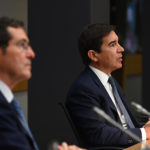Carlos Torres Vila: “Reactivating the economy for a digital, data-based, social and sustainable future is urgent”
BBVA’s Group executive chairman underscored the urgency of reactivating the economy to prevent damage that could be irreversible - something we should do standing “united and with consensus.” At an event organized by the Spanish Federation of Businesses (CEOE), Carlos Torres Vila indicated that “private investment is crucial to a digital, data-based, social and sustainable future.”

BBVA Group executive chairman Carlos Torres Vila participated today in a corporate summit organized by the Confederación Española de Organizaciones Empresariales (CEOE) entitled ‘Spanish Companies: Leading the Future,’ together with Santander chairwoman Ana Botín and other leaders of Spanish financial institutions. During his presentation, which participants could watch via streaming, BBVA’s chairman indicated that the lockdown has proven to be a highly effective and necessary tool to contain the pandemic. “But in the current situation, reactivating the economy is urgent to avoid damage that could be irreversible. Without letting our guard down,” he said. “The virus could be around for many months, or even years, so we have to learn to live with it, keep the epidemic at bay while recovering economic normality.”
BBVA’s Group executive chairman noted that: “The crisis gives us a great opportunity; the opportunity for us to advance decisively in our long-term priorities, taking advantage of the vast, historic amount of resources that are going to be invested, not only to reactivate and repair the damage that has been caused, going back to the way things were, but to advance decisively toward the Sustainable Development Goals (SDGs) and in the digitization of the economy. We have to stand united and in consensus to do this,” he stressed. “One of the main areas of focus for public policy should now be fomenting private initiatives, laying the foundation for them to flourish and develop, and bring economic growth and prosperity for everyone.”
In his opinion, it is particularly urgent to help the hundreds of thousands of viable businesses whose activities were paralyzed and the more than five million people who lost their jobs in Spain, or whose jobs were temporarily suspended. “The best way to rebuild is to minimize the destruction and foster the reactivation in an urgent and decisive manner,” he said. He also called for “extending the ERTE temporary layoff scheme and making it flexible. “The design of the basic income, entering into force rapidly, with extensive parliamentary support was also very positive.” Finally, he spoke of the credit lines offered by the Official Credit Institute (ICO), which have provided over half a million businesses and the self-employed nearly €70 billion in financing, an amount that will continue to grow.

Antonio Garamendi, chairman of CEOE, and Carlos Torres Vila, BBVA Group's executive chairman.
The role of banks
In this regard, he indicated that: “Since the start of the crisis, banks have stepped up to support authorities, our customers and society as a whole to overcome this difficult situation.”
BBVA’s Group executive chairman recalled several of the actions the bank has taken to help families whose income has diminished with initiatives like advances on unemployment payments, the deferral of mortgage payments and other loans, or offering small businesses and the self-employed liquidity and financing.
The BBVA Group’s donation of over €35 million on a global level also stood out. It is being used to support scientific research on the disease, as well as for the purchase of critical medical equipment, which was acquired thanks to our teams’ tremendous work, and in collaboration with healthcare authorities and other large Spanish companies.
He explained that: “Europe’s response is crucial to reactivating the economy,” with joint support and recovery programs, thus preventing differences from emerging based on countries’ fiscal capacities. He spoke of the recovery plan proposed by the European Commission, “which is headed in the right direction” both in terms of its size, and the allocation of funds. “We need this program to be launched as soon as possible,” he said.
In his opinion, “We have to take advantage of the opportunity that the crisis is giving us to make decisive progress in our long-term priorities,” mentioning digitization, data, artificial intelligence and clean energy. And to do so, we need the greatest possible consensus in the implementation of durable reforms. Carlos Torres Vila underscored several fields that are especially relevant: education, as the driver of growth and equality; the labor market, which continues to need improvements in efficiency and equality; and in the budgetary field, Spain should deepen its efforts to clean up its accounts.
Carlos Torres Vila concluded his presentation by recalling that giving confidence is the best way to increase the effectiveness of fiscal stimulus measures, facilitate the financing of our economy, and foment and strengthen the investment.” From his perspective, “with this framework of fiscal and regulatory confidence, public resources will multiply because it will attract private investment to this digital, data-based, social and sustainable future.” An investment that “banks firmly support,” he emphasized. Finally, he stressed that private investment from companies should be fomented because “they generate wealth, create jobs, and just like the theme of this forum, they are the companies that are leading the future.”